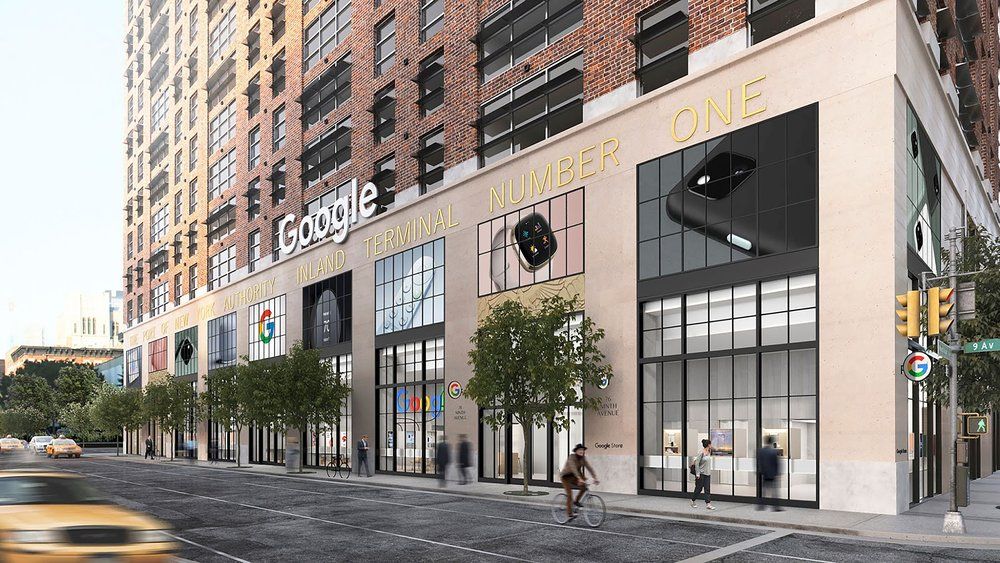Google Store, No Data for Profit, Snap AR Spectacles

20 Years After Apple, Google Opens a Retail Store
It's 20 years since the first Apple Store opened in Tyson's Corner VA. And it's hard to overstate the importance of Apple's stores in the company's success. Now after several years of flirting with opening a permanent store, Google is finally putting one in its building in Manhattan. It will showcase Google hardware: "an extensive selection of products made by Google, ranging from Pixel phones to Nest products, Fitbit devices to Pixelbooks and more." The store will also offer service and support: "We’ll have experts on hand to help visitors get the most out of their device, such as troubleshooting an issue, fixing a cracked Pixel screen or helping with installations." The scheduled opening is this summer.

Our take:
- The store will promote Google hardware, but there's an opportunity to educate/support SMB marketers (think Genius Bar-style classes).
- Google is unlikely to pursue that SMB vision however; it would take a significant and sustained effort to deliver on its promise.
- Google's decision to put the store in its own building may be a pre-CYA move should it decide to not to open more stores.
Data for Profit: Nearly 80% Don't Approve
A clever new spot from Apple likens ad tracking to personal harassment. It shows how Apple's tracking notifications make personal data "stalkers" disappear. So far opt-in rates remain low but have inched up since the launch of iOS 14.5. A recent survey by Invisibly (n=1320 adults) asked whether people "approve of having their personal data sold for profit." The majority want to control who accesses their data (77%) and don't approve of companies profiting from it (79%). But 46% said they might be interested in selling their own data. Finally, a new bipartisan Senate bill would force tech companies to give users more control over data and allow them to opt-out of tracking. Facebook, Google et al are hoping for some sort of federal privacy legislation this year.
Our take:
- "We know you don't trust us": Google introduced a range of new privacy features at its developer conference this week.
- While Apple's IDFA opt-in rates have increased, they're likely to net out well below 20% in the US.
- That nearly half the survey audience (above) were interested in monetizing their own data shows users will opt-in for incentives.
Snap's Spectacles: Is the AR Era Upon Us?
Snap launched its first Spectacles in 2016. This week the company introduced version 4 of the product, featuring augmented-reality for the first time. The glasses make it possible to see AR effects layered on top of your immediate field of vision. Here's the catch: unlike the earlier versions, these glasses aren't for sale. Snap is giving them to a select group of "creators" to see what they come up with – and to build buzz. Snap CEO Evan Spiegel believes it will be a decade before AR glasses go mainstream. Yet AR momentum is definitely accelerating. Earlier this week Google announced the expansion of Live View on Google Maps. And Niantic Labs recently introduced Lightship ("ARDK") for developers. Apple is rumored to be developing own (expensive) mixed reality headgear for release in the next few years.
Tapping the vast potential of @Snap’s AR platform, the next generation of Spectacles allow you to overlay Lenses directly onto the world in front of you, for an immersive AR experience. #SnapPartnerSummithttps://t.co/r4XnSC886z pic.twitter.com/UTDDoxwBOO
— Spectacles (@Spectacles) May 20, 2021
Our take:
- Google Glass launched in 2013; it was goofy and too expensive. All the major tech companies are now working on "smart glasses."
- Beyond the "Black Mirror" scenarios, AR glasses could be quite useful for local information and productivity. Getting the UX right will be very hard.
- To go mainstream, they'll need a trifecta: price, aesthetics and functionality. They'll also easily need to turn on and off.
Recent Analysis
- What Happened to Yelp: A Hospitality Reviews Case Study
- How Google Came to Dominate Local Reviews
Short Takes
- Foursquare buys geospatial analytics platform Unfolded.
- Five search trends that are here to stay.
- What if regulators controlled the Google algorithm?
- Apple users' data in China fully accessible by the state.
- Ring doorbell cams largest 'civilian surveillance network' ever seen.
- Oregon: no masks for vaccinated but businesses must verify status.
- G's smart-home devices becoming compatible with Apple's HomeKit.
- FTC pushing Amazon to take action against rampant fake reviews.
- More than 450K unfilled cybersecurity jobs in US.
- SMB owners struggle to match wage increases by corporations (WSJ).
- Led by digital US advertising market up 52% over April 2020.
Listen to our latest podcast.

How can we make this better? Email us with suggestions and recommendations.

